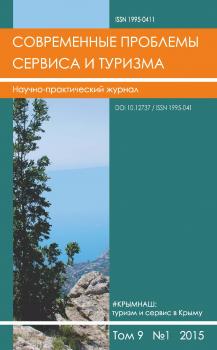Voronezh, Russian Federation
The prospect of tourism development in rural areas is connected with use of various approaches and models of the organization of agrotourism taking into account an environment and cultural and historical heritage of each region at steady observance of requirements of environmental protection, the quality standards and safety of tourists on vacation. Problems and perspectives of agrotourism development are caused by tendencies and changes in agriculture, problems of social and economic development of rural territories as in general in Russia, and in the Ivanovo region, directly. In this regard the Ivanovo region is the most interesting object for studying in Central Federal District because by the level of social and economic development it is the most crisis, depressive territory and takes the last place in relation to all regions of the district. In the territory of the district is represented a very wide range of attractive tourist recreational facilities and complexes which are popular both among Russian and foreign tourists. Experience of many European countries proves that in many Russian regions including the Ivanovo region possessing considerable ecological, recreational, social and cultural potential, development of agrotourism in rural areas can be the most effective instrument of their social and economic development. In recent years the Ivanovo region shows dynamic development of tourism, and offers unique tourist products. The biggest part of tourist resources of the region is located in rural areas. In article the characteristic of conditions for development of agrotourism in the region is given. Prospects of development of this type of tourism on the example of guesthouses are shown.
rural guesthouse, agrotourism, Ivanovo region.
Сельский туризм в современных социально-экономических реалиях, в условиях максимальной антропотехногенной нагрузки, психо-эмоционального состояния населения в последнее время пользуется большим спросом как среди туристов европейских государств, так и непосредственно жителей российских городов. Понятие сельского туризма имеет разные вариации в различных странах. В Финляндии под ним понимается сдача в аренду домов в сельской местности, предоставляющих услуги питания для рекреантов. В Венгрии сельский туризм подразумевает проживание отдыхающих в сельской местности и, по желанию, участие в сельскохозяйственных работах. В Словении распространен отдых в сельской местности, где туристы размещаются с семьей фермера или в гостевом доме, и популярны экскурсии с целью осмотра хозяйства. В Нидерландах сельский тур-продукт включает, как правило, разработанный пеший, конный или веломаршрут [12]. В Греции основной принцип сельского туризма - «Bed&Breakfast» - предоставление комнаты в традиционном стиле и завтрака на основе домашних продуктов [11]. Согласно J. W. Kloeze [9] сельский туризм включает в себя ряд мероприятий, услуг фермеров и сельских жителей для привлечения туристов в целях получения до п ол н ител ь н о го дохода. Несмотря не то, что туризм очень быстро развивается в глобальном аспекте, сельский туризм все еще находится в зачаточном состоянии по сравнению с другими видами туризма.
1. Modeli funktsionirovaniya gostevykh domov Ivanovskoy oblasti// URL: http://www.agritourism. ru/media/uploads/documents_filial.docx (Data obrashcheniya: 12.02.2015).
2. Organizatsionno-pravovye osnovy deyatel´nosti, gosudarstvennaya podderzhka i osobennosti bukhgalterskogo ucheta pri organizatsii sel´skogo turizma. Metodicheskie rekomendatsii. Cheboksary: RSPOK «Sodeystvie», 2009. 154 s.
3. Trukhachev A. V. Vliyanie gosudarstvennogo regulirovaniya sel´skogo turizma na integratsiyu kre-st´yansko-fermerskikh khozyaystv v turistskuyu industriyu. URL: http://conf.sfu-kras.ru/mn2015/. docx (Data obrashcheniya: 12.02.2015).
4. Yakovenko N. V. Depressivnye regiony Rossii: metodologiya, teoriya, prikladnye aspekty (na primere Ivanovskoy oblasti): Avtoref.... d-ra geogr. nauk. Voronezh, 2013. 40 s.
5. Yakovenko N. V., Shilov Yu. M. Model´ razvitiya agroturizma «maloe semeynoe khozyaystvo». Ekonomika. Upravlenie. Pravo. Nauchno-prakticheskiy zhurnal. 2010. № 5. S. 34-36.
6. Alyward E. Rural tourism development: proposing an integrated model of rural stakeholder network relationships// In 1AM conference. Galway: Mayo institute of technology, 2009.
7. Farmaki A. An exploration of tourist motivation in rural setting. Tourism management perspective. 2012. Vol.2. №3. P. 72-78.
8. Holland J., Burian M., DixeyL. Tourism in pro-poor rural areas: Diversifying the product and expanding the benefits in rural Uganda and the Czech Republic//PPT working paper. 2003. № 12. URL: http:// www.propoortourism.org.uk/12_rural_areas (Accessed on December 10, 2012).
9. Kloeze J. W. The Benefits of Rural Tourism, the Role of the State, and the Aspects of Training and Cooperation. Formal Speech held at the Central and East-European Federation for the Promotion of the Green-Soft-Rural Tourism Conference «Rural Tourism Development in Bulgaria and in the Balkan Countries», Karlovo, 1994.
10. PesonenJ.A. Segmentation of rural tourists: Combining push and pull motivations. Tourism and Hospitality Management. 2011. Vol. 18. № 1. P. 69-82.
11. Peters K. Background Paper on Rural Tourism and Regional Development//Of the Green-Soft-Rural Tourism Conference «Rural Tourism Development in Bulgaria and in the Balkan Countries». Karlovo, 1994.
12. Turner C. Rural Tourism in Greece. In the workshop «Recreation, Tourism and Regional Development». Wageningen, 1993.





